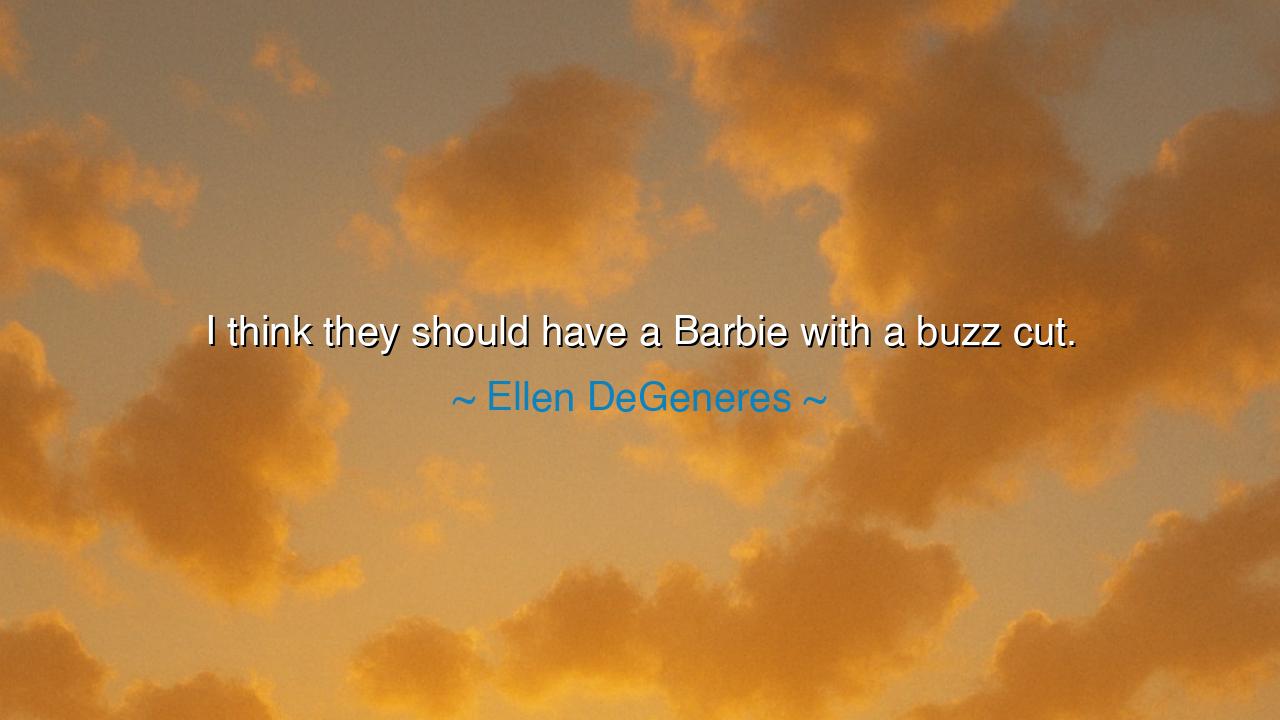
I think they should have a Barbie with a buzz cut.






In the age of polished beauty and mass illusion, the jester-sage Ellen DeGeneres once spoke with her gentle defiance: “I think they should have a Barbie with a buzz cut.” To some, it was a quip tossed lightly into laughter. Yet beneath that jest lies a revelation — a truth about identity, courage, and the tyranny of appearances. For the figure of Barbie, that eternal symbol of perfection molded in plastic, has long stood as a mirror of society’s ideal woman: flawless, smiling, unchanging. And when Ellen calls for a Barbie with a buzz cut, she is calling not for a toy, but for transformation — a revolution of perception, a new vision of beauty that includes imperfection, authenticity, and strength.
The origin of this quote arises from DeGeneres’s lifelong dance with humor as both weapon and shield. As one who walked the difficult path of self-discovery in a world that demanded conformity, her laughter became her language of truth. In suggesting a Barbie with cropped hair — hair often seen as a symbol of defiance, illness, or liberation — she casts light upon the narrowness of society’s vision. The buzz cut becomes the emblem of individuality and resilience. It stands against the myth that beauty must conform, that femininity must be soft, that power must always smile. Through her jest, Ellen lifts the veil of satire to reveal a plea for a more compassionate world — one where every form of self is worthy of the title “beautiful.”
Throughout history, hair has been a symbol of power, identity, and transformation. When Joan of Arc cut her hair and donned a soldier’s armor, she defied both custom and kingdom. Her cropped head became her declaration: that spirit, not softness, defines womanhood. Centuries later, Ellen’s “Barbie with a buzz cut” carries that same fire. It whispers to every girl and every woman: You do not have to fit the mold. You are not made of plastic. In its humor lies the echo of a warrior’s cry — that authenticity is not rebellion but remembrance, the remembering of one’s true self beneath the weight of expectation.
But Ellen’s jest also contains tenderness. A buzz cut is not always chosen; sometimes it is born of struggle. Those who lose their hair to illness — to chemotherapy, to time, to trauma — often lose with it the world’s approval, for society’s gaze is cruel to those who look “different.” By imagining a Barbie with a buzz cut, DeGeneres honors these quiet warriors. She turns a toy once built for perfection into a symbol of empathy, whispering that beauty is not the absence of pain, but the grace to live through it. To place such a doll in the hands of a child would be to teach that strength can wear any face, and that courage itself is a form of beauty.
There is in Ellen’s humor the same wisdom that guided the philosophers of old. The ancient Stoics taught that the outer form is fleeting, and only character endures. DeGeneres, in her way, translates that truth into laughter. Her words urge us to look past the gloss and glitter of culture’s idols — the sculpted faces, the perfect smiles, the symmetrical illusions — and see the soul beneath. In a world that profits from insecurity, to laugh at perfection is to reclaim one’s freedom. Thus, her Barbie with a buzz cut is not a doll but a declaration: that self-acceptance is the most radical form of rebellion.
Consider also the modern story of G.I. Jane, the fictional soldier who shaved her head in defiance of those who said she could not endure as men do. That single act, though dramatized, became an emblem of equality — of women claiming their right to define strength on their own terms. Ellen’s imagined Barbie continues this legacy. It tells us that beauty is not diminished by power, and that femininity can dwell in the boldness of a bare scalp as easily as in the wave of golden hair. The buzz cut, stripped of ornament, becomes a crown of truth — simple, unpretentious, real.
Therefore, O listener, take from this jest the lesson it hides within its laughter: be unafraid to remake yourself. The world will always build its idols of perfection, but your task is to carve your own reflection from the living stone of authenticity. If your hair, your voice, your path, or your dream does not fit the mold — rejoice! You are not meant to be molded; you are meant to be free.
So laugh, as Ellen laughed — with courage, with compassion, with light. Be your own Barbie with a buzz cut: unpolished, unapologetic, and alive. For true beauty does not rest in the symmetry of features, but in the symmetry of spirit — the balance between laughter and truth, between who the world expects you to be and who you truly are. And when you find that balance, let it shine. Let the world see that even a single act of self-acceptance can become a revolution wrapped in a smile.






AAdministratorAdministrator
Welcome, honored guests. Please leave a comment, we will respond soon